Last October, I had the opportunity to spend a week with David Harrison and 14 other children’s writers at the Highlights Foundation’s children’s poetry workshop, “Poetry: For the Delight of It.” Although it’s taken several months to post, it’s my pleasure to finally be able to bring you this online conversation David and I had, following the workshop!
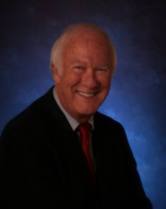 David Harrison’s first book for children, The Boy With a Drum, was released in 1969 and eventually sold over two million copies. In 1972, David won national recognition when he received the Christopher Award for The Book of Giant Stories.
David Harrison’s first book for children, The Boy With a Drum, was released in 1969 and eventually sold over two million copies. In 1972, David won national recognition when he received the Christopher Award for The Book of Giant Stories.
Since then, David has published over 90 books that have sold more than 15 million copies and earned numerous honors!
He has been anthologized in more than 100 books and appeared in dozens of magazines and professional journals, and his work has been translated into twelve languages and presented on television, radio, cassette, and CD-ROM.
David’s SKY HIGH ON READING program was the International Reading Association’s nationwide winner in 2001. The Missouri Librarian Association presented him with its 2007 Literacy Award for the body of his work.
In the last 25 years, David has been a speaker, featured author, or presenter at nearly 300 state, regional, and national conferences in 30 states, and maintains a blog to let readers know what he’s up to and encourage them to write their own poetry. David holds science degrees from Drury and Emory universities and honorary doctorate of letters degrees from Missouri State University and Drury University. He has an elementary school named for him and is poet laureate of Drury. He lives in Springfield, Missouri with his wife Sandy, a retired guidance counselor.
First of all, I’d like to thank you, David, for finding the time to do this interview; you’re a busy man! Tell me about some of the highlights (no pun intended!) of what you’ve been up to this past year.
Pun accepted, Matt. It’s kind of you to interview me for your blog. Thanks for asking. In the spring, Shell Publication introduced a set of five books that I co-wrote with Mary Jo Fresch, a professor at OhioState. Collectively the books are called Learning through Poetry. I wrote 96 poems for the series and Mary Jo created classroom activities based on them.
A picture book called A Perfect Home for a Family came out with Holiday House and a kit called Let’s Write this Week with David Harrison was introduced by Phoenix Learning Resources. The kit contains twenty 5-minute DVD lessons, a teacher’s guide co-written with Drury University’s Laurie Edmondson, twenty copies of a student writing journal, and three of my books that were used as examples in the text. 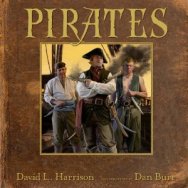 I was in Texas, Boston, and other places to present at conferences and enjoyed conducting another poetry workshop at the Highlights location in Pennsylvania.
I was in Texas, Boston, and other places to present at conferences and enjoyed conducting another poetry workshop at the Highlights location in Pennsylvania.
A definite highlight was when my book of poems, Pirates, was selected by MissouriCenter for the Book to represent Missouri at The National Book Fair in Washington, D.C. this past fall. I didn’t make the trip but am told that about 200,000 others did.
Speaking of the Highlights workshop, it was a pleasure to finally meet you in person, after having spent so much time chatting on your blog and via Facebook. What do you feel your role is, as a writer, mentor, blogger?
Mostly I’m a writer. On days without other obligations I work at being a writer from 6 a.m. to 6 p.m. Monday through Friday. This involves numerous activities besides working on a manuscript. My blog takes some time. So does keeping up with correspondence, preparing for workshops, keynotes, and presentations. I also work with various literacy groups and my wife and I travel quite a bit. My rule of thumb is that I will respond to general queries from writers who ask for how-to information but stop short of reading their work. I do critiques as part of a workshop environment, and this year I agreed to be the Missouri mentor for SCBWI.
With so many people trying to break into the world of children’s publishing, and with so many posting their work online via Facebook, personal blogs, or other outlets (Yours Truly included!), do you think it’s difficult for the average reader to differentiate between ‘good’ material and just ‘average’ material? It seems like the less that poetry is being published traditionally, the more it’s popping non-traditionally, and it’s getting hard to keep track of it all!
It’s a good news bad news situation. Thanks to the Internet, many more books and poems are now available to a reading public. Some of the material is wonderful, some is horrid, and the vast majority – as usual – falls somewhere on the slope between the peak and valley. The freedom to publish one’s own work can bring enormous satisfaction. Finding readers is difficult without the traditional support of print publishers, but that’s the tradeoff.
Long term? More poets publishing more poetry for more readers seems like a good thing to me. My assumption is that the good stuff will eventually be recognized for its quality and most of the rest will remain fairly anonymous except for the happy poet and his/her immediate circle of family and friends. Not a bad thing!
What advice can you offer aspiring authors and poets? And what do you think aspiring writers need to do, that perhaps they may not be doing?
Beware of advice from duffers and codgers. Back in my day, we had to write our stories in the dirt with our fingers. We had to carry our manuscripts all the way to New York because we couldn’t afford stamps. Editors breathed fire and their breath smelled of coal. I’ve never had much useful advice to offer, Matt. Getting good at anything requires approximately the same approach be it volleyball or be it making it to Carnegie Hall: practice.
If Malcolm Gladwell is to be believed, it takes 10,000 hours of it. I think what makes the craft of writing more difficult than many realize is that it’s a highly competitive profession in which practitioners are often self-taught. It’s like completing a four-year college major on your own. So set up realistic goals. Celebrate small successes of any kind. And write! Write every chance you have. Try different genres. Experiment. But write. Practice, practice, practice.
And of course, read, read, read – it’s one of the best ways to learn! Which leads me to my next question. We all have favourite authors who somehow exert their influence on us, even if we don’t want them to; who are your favourite poets or authors, and how has their writing affected yours?
I like E. B. White’s beautifully written essays, his book on the elements of style and, of course, his books for children. He’s the master of the language. I love Frost’s musings and Elliot’s cats and Collins’s approachable eloquence. I began writing short stories back in the day so I read a lot of Hemingway, Steinbeck, Updike, Bruce Friedman, Kurt Vonnegut, and Terry Southern. I have loved the novels and stories of Joan Didion, Barbara Kingsolver, and Annie Proulx. Among the writers of children’s literature who inspire me, the list would be long and I would fear leaving out someone by oversight.
So who or what inspires you? And who do you trust for feedback on your writing?
By training and by nature I love nature. I’m happy watching geese take off from the lake behind our house, as I did during this interview. Wild creatures inspire me. I love children but am rarely moved to write something that has been inspired by them. I find my ideas in unexpected places and believe it’s because some part of a writer’s brain is always receptive to the possibility of turning nothing into something. I work alone and don’t want anyone to see my manuscript until it’s ready. Then I take it to my wife Sandy. She has always been my first reader. She’s honest and I need her to be.
By the way, you are the only person I know to have a school named after them! How did that come to be?
The Superintendent of our school district called one day to tell me that 40+ names had been submitted by the public for an under-construction elementary school and I was among the final three candidates. He called back sometime later to congratulate me and invite me to a school board meeting to make it official. When the school opened, I was asked to give the opening talk to the student body (K-4), its teachers and staff, and various officials of the district. My family came as well as Kent and Jody Brown (of Highlights Foundation) who flew in from Pennsylvania to honor me with their presence. My speech was put into a time capsule. In the front hall on either side of the library entrance a collection of my work was placed on display for three years in two sixteen-foot long glassed cases.
David Harrison Elementary School cost $10 million to build in 2009 and rests on seventy-two acres. Click HERE to visit their website!
You are also the only one I know who has provided inspiration for a playwright; your poetry inspired Sandy Asher’s school plays, Somebody Catch My Homework and Jesse and Grace: A Best Friend’s Story. How did these works compare with your originals – and is it even fair to compare them?
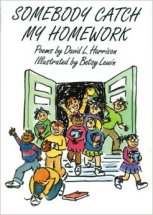 Sandy and I have been close friends and writing partners for a long time. For the play, Somebody Catch My Homework, she went through my published poetry and folders of poems-in-waiting and fished out a group of fourth grade characters to form the basis of a play. I love it, of course, and sit up straighter each time an actor in the play steps forward, as though to sing but, instead, recites one of my poems. The play has been a success both here and elsewhere.
Sandy and I have been close friends and writing partners for a long time. For the play, Somebody Catch My Homework, she went through my published poetry and folders of poems-in-waiting and fished out a group of fourth grade characters to form the basis of a play. I love it, of course, and sit up straighter each time an actor in the play steps forward, as though to sing but, instead, recites one of my poems. The play has been a success both here and elsewhere.
Jesse and Grace was also Sandy’s brainstorm. In this case she and I became fourth graders, lifetime friends, who take turns presenting our thoughts in a series of poems. Jesse and Grace have a serious spat and we had to work through it all by expressing our feelings as if we had no idea what the other might be thinking. When it came time to turn the book manuscript into a play, I turned down Sandy’s kind offer to co-write it with her. She’s a wonderful playwright and I’m not. That was her department.
Jesse and Grace went on to receive one of the most prestigious awards in the world of children’s plays, the Distinguished Play of the Year presented by Alliance of American Theatre and Education.
I think it’s important for all of us to be willing to try new things, and that’s what you did two years ago when you published Goose Lake: A Year in the Life of a Lake, an eBook of poetry for adults. What spurred you to publish this book, and what did you learn from the process?
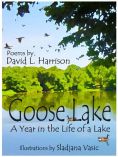 Goose Lake was something I needed to write. I spend time every day I’m home gazing through the windows or sitting outside watching the comings and goings of an endless parade of birds and creatures. I showed the manuscript to a couple of editors and got some of the most enthusiastic replies about my work that I’ve ever received. But their answers were no. Too local. Too mature. Too eclectic.
Goose Lake was something I needed to write. I spend time every day I’m home gazing through the windows or sitting outside watching the comings and goings of an endless parade of birds and creatures. I showed the manuscript to a couple of editors and got some of the most enthusiastic replies about my work that I’ve ever received. But their answers were no. Too local. Too mature. Too eclectic.
I decided to try this e-book thing to see what it was all about. Thus, a collection that appeals to me greatly now lives its lonely life on Amazon and B&N. For a mere 99 cents you can be a proud owner! Is there anything about “lonely” that you need me to explain?
Ha, no…as a poet, we’re all supposed to be lonely and sullen, with dark, tortured souls, right?? Hey, before we wrap up, I need to ask you: what are you working on now?
I just finished the poetry for a new series of three grade level books. What remains are the final revisions to call it a wrap. I’m well into a new collection of poetry for a trade publisher. A recently completed collection of poems is now scheduled for publication although it won’t be until 2016. With Mary Jo Fresch I’m at work on a new proposal for another educational publisher. I have other ideas in various stages and expect this to be a busy year.
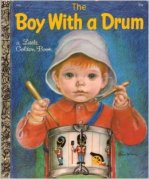 Well, thank you again, David, for sharing your time and thoughts…and best wishes for a wonderful 2014!
Well, thank you again, David, for sharing your time and thoughts…and best wishes for a wonderful 2014!
And thank you again, Matt. I’ve enjoyed it.
To learn more about David, log on to his website here or visit his blog!
===================================================================
Did you like this post? Find something interesting elsewhere in this blog? I really won’t mind at all if you feel compelled to share it with your friends and followers!
 To keep abreast of all my posts, please consider subscribing via the links up there on the right! (I usually only post twice a week – on Tues. and Fri. – so you won’t be inundated with emails every day) Also feel free to visit my voiceover website HERE, and you can also follow me via Twitter , Facebook, Pinterest, and SoundCloud!
To keep abreast of all my posts, please consider subscribing via the links up there on the right! (I usually only post twice a week – on Tues. and Fri. – so you won’t be inundated with emails every day) Also feel free to visit my voiceover website HERE, and you can also follow me via Twitter , Facebook, Pinterest, and SoundCloud!

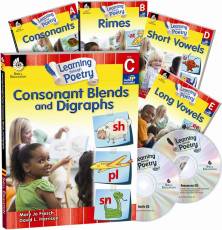
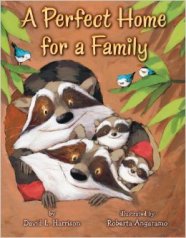
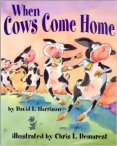
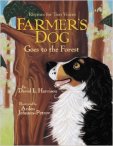

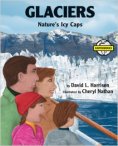
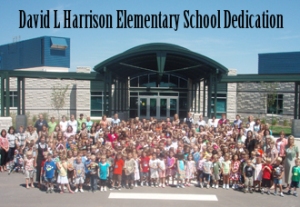
Ah, silly me! I did not guess the name of your guest correctly. Of COURSE it’s David. Hi, David! Excellent interview, Matt. I like how your cunning questions slowly revealed the layers of lethargy and laziness that plague this poet. I mean really — only 17 books in the works at one time? Pshaw.
Just pulling your leg, David. You are a daily inspiration to so many of us, and I love all you do for children AND poetry through your educational projects. Keep ’em coming! 🙂
LikeLike
Thanks, Renee! And thank you again, David, for somehow finding the time to do this interview. Honestly, it’s amazing how some people can take a year or more to write 96 poems, and others write them all for one book in the space of a few months!
LikeLike
My goodness, Renee. I don’t know who you are, but you’re very kind to strangers! How are things with the boys these days? Are they in college yet?
LikeLike
It is a pleasure reading more about you, David. You indeed are a busy poet! Thanks Matt for the interview of all things David!
LikeLike
David, your energy and willingness to try new things is an inspiration! Great interview, Matt!
LikeLike
Such an enjoyable interview! Thanks, Matt and David!
LikeLike
Thank you, Linda, Deb, and Penny…glad you all enjoyed it!
LikeLike
Thanks everyone. I told Matt to make up whatever he had to to make me look good. He’ll probably go to jail for perjury but I don’t care. Thanks for taking one for the team, Matt.
LikeLike
You’re welcome, David! Anything to help improve your image in the world of kid lit.
LikeLike
Thanks for the enjoyable interview, Matt. David, it makes me tired just reading about all your projects. You are an inspiration (which means now I should get back to writing…)
LikeLike
Why do you think it took so long for me to do this blog? I was worn out just from reading about everything he’s doing!
LikeLike
You two are quite a pair! Thanks to both of you for this winning interview.
David, hope to bump into you again in person one of these days! Really enjoyed your responses to Matt’s great questions – the “some part of a writer’s brain is always receptive to the possibility of turning nothing into something” hits the nail on the head. Keep up all the lively work.
LikeLike
That quote struck me, too, Robyn – so very true, and something of which we writers should be proud!
LikeLike
What a feel good day this is for me. I’m grateful to Matt for the interview and to each of you for reading and leaving such nice comments. Thanks again.
LikeLike
I’m glad I brightened your day, David!
LikeLike
Pingback: Poetry Friday: “Beulah Buford” | Radio, Rhythm & Rhyme
Great interview, gentlemen! So nice to hear more about David and his many projects. Truly he is an inspiration and a role model!
LikeLike
He is, indeed!
LikeLike
Hey, Matt! I’m glad to see you back in the blogosphere. Fabulous interview. Of course, with David as your subject, how could you go wrong? I must find Sandy’s book of plays! Thanks to you both for inspiration, insight, some needed prods, and good company. It seems that all I do lately is shovel snow. ;0)
LikeLike
Thank you for your kind words, Karen! If you want, you can help finish shoveling our 12″ here…I wouldn’t mind.
LikeLike
Haha. I get your drift!!! We got about 12 yesterday and they now say 2 to 4 tomorrow. I heard that this past storm was named Winterstorm Pax, but I prefer Blanche. ;0)
Take it easy!
Karen
LikeLike
I prefer Winterstorm Annoying. 😉
LikeLike
Nice duet, Matt and David! I know both of you somewhat or better, and I still found much to enjoy and think on. Hope to be able to workshop with both of you again sometime!
LikeLike
Thanks, Heidi – I would love to be able to get back together sometime with my Highlights cohorts!
LikeLike
Thanks to all for this ongoing conversation. I’ve been on the road for a while so this was my first chance to check in.
LikeLike
Well, thanks for checking back in!
LikeLike